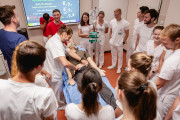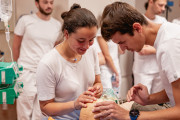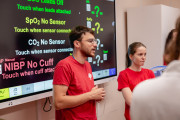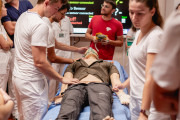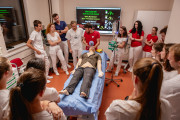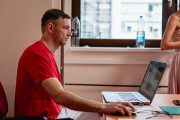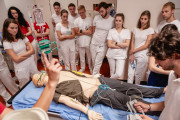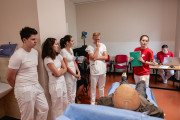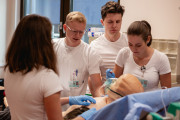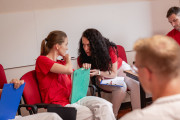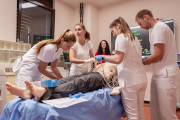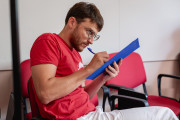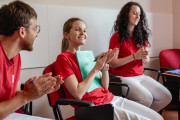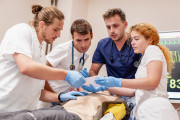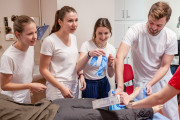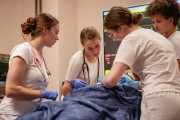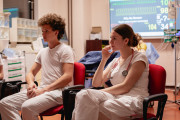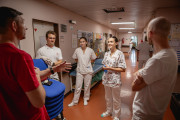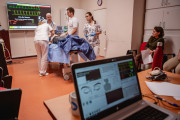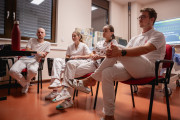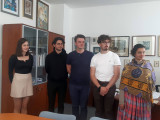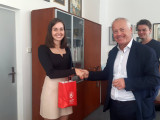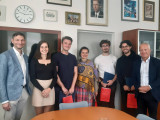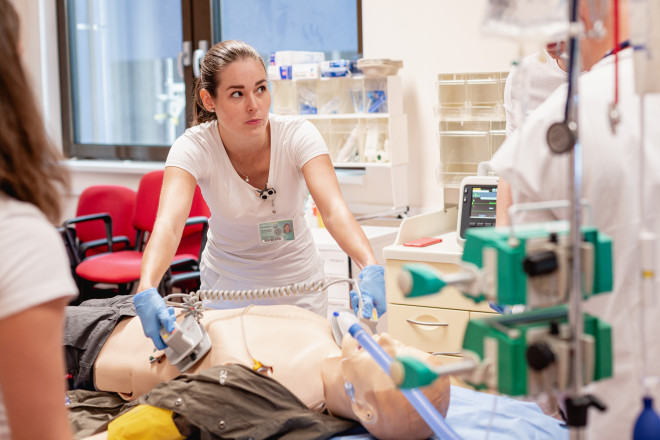
Tension. The patient, though rubbery, is in critical condition. The machines are beeping. No results coming back from the tests. Does it always take this long? Patient's collapsing. Concentration. A little groping, figuring out more symptoms. Finally, a diagnosis comes out. Action. Everyone knows where they're going. Patient's stabilized.
All this was experienced by four groups of students who decided to enter the Simulation Olympics, which was organized by the Simulation Medicine Section of the Department of Anaesthesiology, Resuscitation and Intensive Care Medicine of the Second Faculty of Medicine and Motol University Hospital and whose soul was MUDr. Jan Bureš.
The Drsňáci (The Roughnecks) were the best out of eight teams. The Drsňáci team were Veronika Šenkeříková, Tereza Pekárková, Jakub Sadílek and Ondřej Ferra.
"Thank you for the opportunity to participate in the Simulation Olympics and we hope that we will bravely represent our faculty in Brno," said Veronika Šenkeříková on behalf of the winning team, referring to the national round.
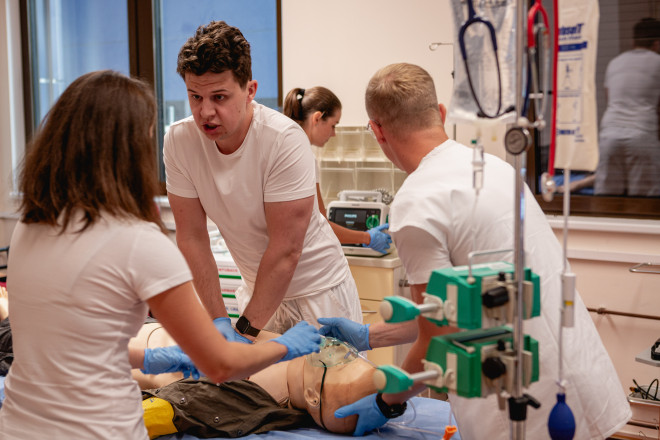
Drsňáci said it helped that they had already attended the simulation medicine seminar in the last academic year.
It was evident in their performance that they had experienced the functioning of a intensive care team, knew the ABC's of providing vital signs for a patient, were aware of the need for a team leader, did not dwell on unnecessary trumping up in an attempt to find the correct diagnosis, and knew how to communicate information.
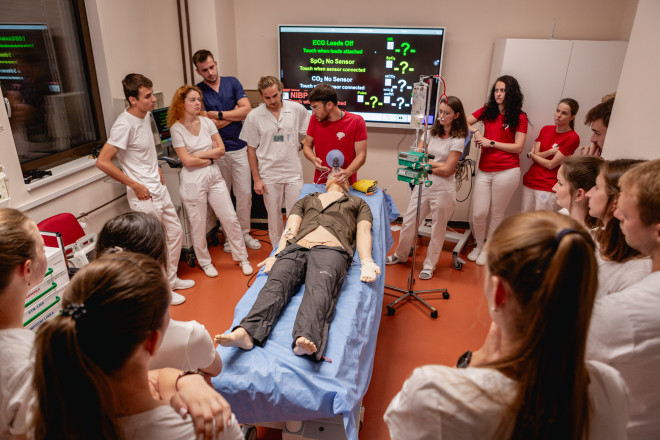
An independent observer might have felt that he was watching a foreign-produced doctor series during their performance.
They weren't the only ones. No team let a patient die. But only one group could win.
Medical procedure, i.e., diagnosis, treatment, or provision of vital signs, as well as technical skills, such as team communication, team leadership, navigating the environment, utilizing resources, and closing communication loops, were evaluated.
Although the original plan was to announce only the winners and not to determine any other rankings, the committee decided to award an additional honorable mention for courage and enthusiasm, and perhaps some sympathetic cheek, to the only team composed of sophomores.
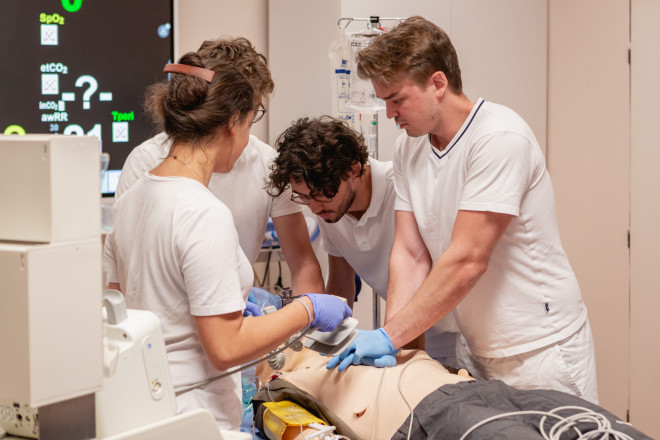
They called themselves Zelenáči (The Greenhorns): Klára Předotová, Kryštof Haratek, Jakub Staněk and Adam Ulbricht.
Although they logically lacked medical knowledge compared to the fifth-graders, they kept the patients alive.
"Your team surprised us. We thought that we could shorten the study of medicine when you know the important things already in the second year," joked Dr. Jan Bureš at the award ceremony under the indulgent gaze of Dean Babjuk.
He appreciated the professionalism of all the teams that participated in the competition.
Simulation is not a competition
"I think that simulations in medicine are quite an important part of both undergraduate and postgraduate education," thinks the creator of the faculty’s round of SimUniversity competition, Jan Bures, head of the KARIM Simulation Section.
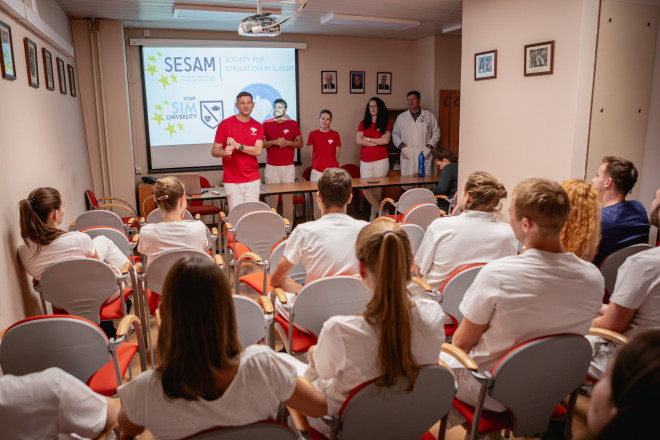
This is confirmed by all participants. During the summary that followed for each team immediately after their performance, it was repeatedly said how great it was to try something like this and that it would be nice to experience a similar style of teaching even more often.
Ironically, competing in simulations goes against the minds of the organizers of the faculty round of the Simulation Olympics.
"Simulation is not primarily intended for competition, it is intended for self-education, for improving the system," said Vojtěch Šimeček, another member of the evaluation committee, in the introduction to the Simulation Olympics.
The SESAM Congress
The first year of SimUniversity at the Second Faculty of Medicine was held this year also because on June 19-21, 2024 the international congress of SESAM, the European Society for Simulation Medicine, will be held in Prague.
"Which is great because it's an amazing opportunity for us to compete here," encouraged Jan Bures before the competition began.

The winners of the faculty rounds will compete in the national round in Brno at the end of November. The winner of all faculty teams of the country will then represent Czech medics in the international competition at the SESAM Congress.
"The interfaculty representation cannot end other than with our victory," believes Vojtěch Havlas, Vice Dean for Specialization Education.
Dr. Jan Bureš invites not only the participants of the Simulation Olympiad, but also other students to the SESAM Congress. He invites them to participate free of charge in exchange for volunteering to help organize the conference directly.
"The congress tends to be less formal. Everyone tries to get the participants to talk to each other and share methods and ideas. A lot of ideas are not so much spread through lectures as through informal ways," Jan Bures explains.

